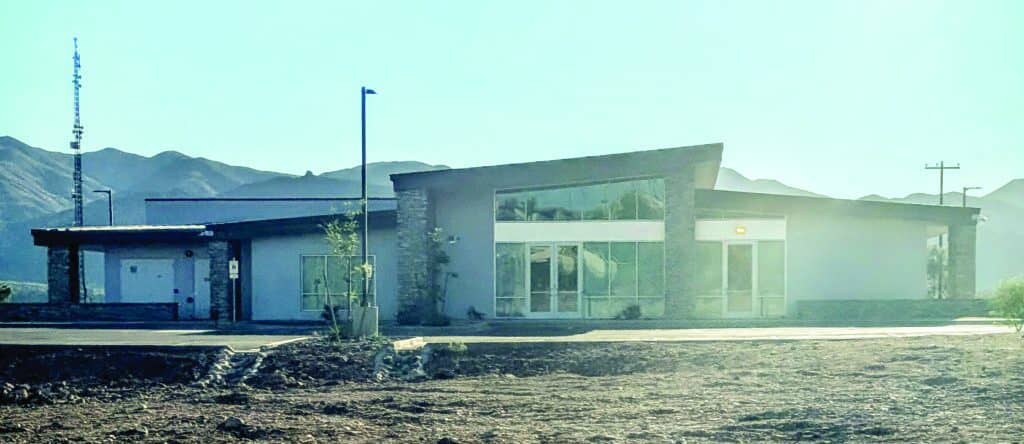
CVRMC’s new Kearny Clinic.
As the negotiations for the recently passed One Big Beautiful Bill were addressed in the media, there became a flurry of information that came out from those opposing the bill. One of the key talking points brought up was lists of hospitals across the nation that would not be able to survive and maintain their operations if the bill was approved. Most of these hospitals listed were rural and remote hospitals.
The One Big Beautiful Bill called for massive tax cuts for the highest tax brackets in America. The bill also created provisions to massively increase the budget for Immigration and Customs Enforcement (ICE). To help fund these tax breaks and increases to the ICE budget, the new bill allows for significant reductions in services and programs that provide benefits to the lowest income, vulnerable Americans.
Significant cuts and program requirements to Medicaid known to Arizona residents as the Arizona Health Care Cost Containment System (AHCCCS) program are what put the Cobre Valley Medical Center on the list of hospitals that would be forced to close if the bill was approved.
CEO of Cobre Valley Regional Medical Center, Dr. Neal Jensen, reported that he was unaware that they would make this list, as the hospital is funded and operates with a variety of funding sources and several types of patients.
“Many of our patients are utilizing Native American health benefits, which have not been cut. A third are private payer insurance, a third are Medicare patients, and a third are Medicaid patients,” he said. This mix of patients, types, and other economic strengths were not part of the calculations, he further explained.
The effects of the proposed changes to the Medicaid program were the only data point that was used to quantify putting the CVRMC on the closure list. The bill, as it was approved, calls for a variety of changes to the program. Those policy changes include new application requirements, such as requiring those using the Medicaid program to re-apply every six months. The new program changes also call for participants to have gainful employment or to be enrolled and attending schools or training programs. There are some caveats for parents of young children or those who have other medical reasons; they may not have to meet the employment requirements. The additional requirements and renewal procedures is expected to create a situation where people may not seek use of the program or force them off of the program, leaving them uninsured.
Jensen shared that the hospital already has a program in place to help patients apply for Medicaid services, and he anticipates that the clinic will continue to offer that help and support when the new changes are put in effect in 2026. Those changes will have to be monitored by the State of Arizona, and the state will need to improve and upgrade its systems. With the new six-month application schedule, the state will no longer be able to auto-populate the client application for continuation of services.
“Our hospital and clinics are one of the strongest hospital systems in the state,” he proudly said. “I want to ensure everyone that our hospital is not going to close, and we will continue to grow and improve our services and facilities.”
Jensen provided more details on Medicaid funding, sharing that during the Great Recession (2008-2010), the Arizona State Legislature reduced the funding reimbursements paid by 10% to medical facilities for Medicaid patients. Those percentages have never been increased, despite inflation and other rising costs. Jensen explained that the hospital adjusted during that time period and stressed that the hospital is financially stable.
Services at the Superior and Kearny Clinic are expected to remain the same, including the ambulance service in Kearny.
“One of our biggest challenges for the Kearny ambulance is hiring local employees to work with the ambulance service,” stated Jensen. CVRMC has 480 employees, and they try to hire as many local employees as possible. “We strive to maintain 75% of our employees being local,” Jensen stated. Their local hire base includes residents from Globe, Miami, Superior, Kearny, Hayden, Winkelman and San Carlos.
Jensen, who is actively involved in several trade groups such as the American Hospital Association and the Arizona Hospital Association, explained that these organizations are working to advocate for modifications to the provisions in the bill.
For those using the Medicaid system, these new program changes will take effect in 2026. The Big Beautiful Bill will also have effects on the Affordable Care Act Insurance Marketplace. New regulations within that health insurance program will also shorten the enrollment periods, increase premium costs and will require and annual income verification.
While Dr. Jensen provided great assurance that the hospital is in strong financial health, he shared that people who miss these enrollment deadlines or no longer qualify for the Medicaid programs, will likely be sicker longer and, without insurance, will likely incur costly medical debt.
